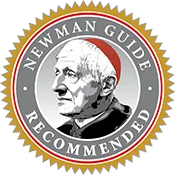This program equips students with a profound understanding of the central teachings of the Catechism of the Catholic Church, emphasizing their relevance to the common good of society, the dignity and transcendence of the human person, and principles of moral living. Students will gain foundational knowledge of the Old and New Testament Scriptures through the lens of Catholic teachings and develop the ability to explain and apply the relationship between faith and reason. Additionally, the program fosters an understanding of key concepts in Church history and their transformative impact on human culture and civilization.
Theology (15 Credits)
Course Number | Course Title | Credits |
|---|---|---|
SCRPT 103 | Survey of the Old Testament | 3 credit hours |
SCRPT 106 | Survey of the New Testament | 3 credit hours |
THEO 103 or THEO 268 | The Moral Life: Living the Virtues | 3 credit hours |
Principles of Moral Theology | 3 credit hours | |
THEO 204 | Foundations of Catholicism | 3 credit hours |
THEO 213 | God, Man and the Universe | 3 credit hours |
Mathematics/Computer Science | Choose One (3 Credits)
Course Number | Course Title | Credits |
|---|---|---|
MATH 105 | General Mathematics for Liberal Studies | 3 credit hours |
COSCI 101 | Computer Essentials | 3 credit hours |
Natural Sciences | Choose One (3 Credits)
Course Number | Course Title | Credits |
|---|---|---|
BIO 101 (recommended) | General Biology | 3 credit hours |
Literature and Composition | Choose Two (6 Credits)
Course Number | Course Title | Credits |
|---|---|---|
ENG 105 (required) | Introduction to Composition | 3 credit hours |
ENG 111 | Introduction to Literature | 3 credit hours |
ENG 310 | Literary Apologetics for Theology | 3 credit hours |
Foreign Languages | Choose One (3 credits)
Course Number | Course Title | Credits |
|---|---|---|
GREEK 101, 102, 201, 202 | Biblical or Advanced Greek | 3 credit hours |
LATIN 101, 102, 201, 202 | Introductory or Advanced Latin | 3 credit hours |
SPAN 101, 102, 201, 202 | Introductory or Conversational Spanish | 3 credit hours |
Humanities/Social Sciences | Choose Four (12 Credits)
Course Number | Course Title | Credits |
|---|---|---|
LIB 200 | Principles of Liberal Learning | 3 credit hours |
CHIST 214, CHRIST 224 or CHIST 244 | Church History I: Early Christians to Middle Ages | 3 credit hours |
Church History II: Renaissance to Modern Church | 3 credit hours | |
History of the Catholic Church in America | 3 credit hours | |
HIST 211 | Christian Civilization | 3 credit hours |
HUM 228 | Introduction to Comparative Religions: Judaism and Islam | 3 credit hours |
Philosophy (6 credits)
Course Number | Course Title | Credits |
|---|---|---|
PHIL 205 | Introduction to Philosophy with Plato and Aristotle | 3 credit hours |
PHIL 235 | Elements of the Philosophy of the Human Person | 3 credit hours |
Theology Electives (9 credits)
General Electives (3 credits)
Catholic International University Provides:
An education in Theology can truly awaken and inform you as a human person of God. And by including Catholic Social Teaching in your educational program, Catholic International University provides you with the tools to transform society while respecting the way God created our world and making use of the freedom He has given us.




